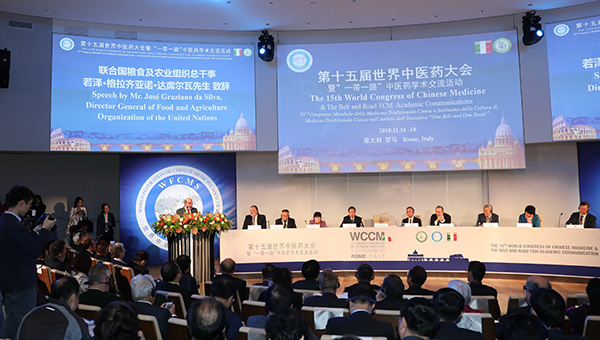 |
|
Jose Graziano da Silva, director-general of the United Nation's Food and Agriculture Organization, delivers a speech during the 15th World Congress of Chinese Medicine in Rome, Italy, in November. The congress covered various topics concerning TCM, such as standardization and endangered herb species preservation.[Photo by Cheng Tingting/Xinhua] |
Lu Chuanjian, a professor at the Guangzhou University of Chinese Medicine, said the lack of international standards is a major obstacle to the promotion of TCM overseas, including its trade.
"Intensified efforts should be made to formulate technical standards for TCM, including guidelines for the diagnosis and treatment of common illnesses, and regulations for commonly used therapies," she said. "Pharmaceutical companies should be encouraged to participate in the formulation of international standards for TCM."
Meanwhile, Lu said authorities should pay more importance to the cultivation of talent for professionals or experts in TCM international standardization so that China can contribute more to the standardization of TCM.
Huang, president of the China Academy of Chinese Medical Sciences, said that despite an increasing number of ISO standards established for TCM herbs in recent years, formulation of the standards should be accelerated to promote its use overseas.
The total number of commonly used traditional Chinese herbs exceeds 600, with more than 300 being cultivated in China, according to the TCM Administration, which means only a small fraction of all the herbs have ISO standards.
As the place where TCM originated, Huang said that China should better use its advantage in the expertise and intensify international cooperation so it can take the lead in the formulation of international standards of TCM. He added that countries involved in the Belt and Road Initiative should cooperate in standardizing traditional medicine from their countries.
"Countries involved in the BRI can establish an information exchange and cooperation platform on the standardization of traditional medicine to promote the development of pharmaceutical industries in these countries, and promote the international use of TCM so it benefits more people," he said.